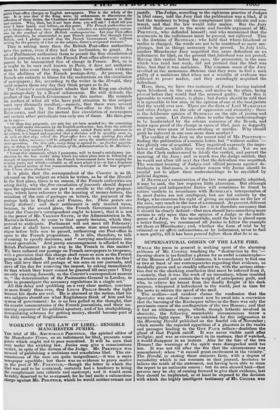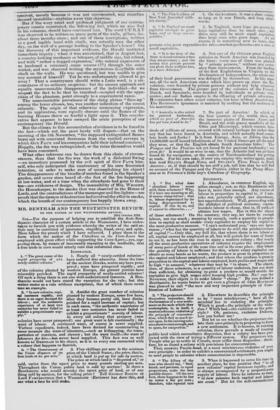SUPERNATURAL ORIGIN OF THE LATE FIRE.
WHILE the press in general is making sport of the alarming evidence of Mr. COOPER touching the "destruction by fire "— burning-down is too familiar a phrase for so awful a catastrophe— of the Houses of Lords and Commons, it is consolatory to find one or two at least of our contemporaries regarding that evidence, so decidedly given and so steadily adhered to, with the serious atten- tion due to the shocking conclusion that must be inferred from it, —namely, that it was the work of an incendiary, whose troubled conscience could not contain the weight of anticipatory guilt, and who, to relieve his breast from the deadly freight of his dark purpose, whispered it beforehand to the world, just in time for the news to outrun the speed of the mail.
The scoffers—and candour claims the confession that the Spectator was one of them—must now be awed into a conviction that the burning of the Exchequer tallies in the flues was only the proximate cause of the conflagration of the two Houses ; and that it had an ultimate origin, which, though hitherto involved in obscurity, the following remarkable circumstances throw a mysterious light upon. We are indebted for this inkrmation to the Morning Herald published on the fearful 5th of November; which records the reported apparition of' a phantom in the vaults and passages leading to the GUY FAux cellars—doubtless the ghost of that Popish caitiff. It was never visible until after twilight; and was so circumspect in its motions, that if watched, it would disappear in an instant. Alas for the fate of the two Houses! the warnings of the spirit were disregarded until too late. It was not till after the fire that the circumstance was remembered; when "it caused great excitement in the vicinity." The Herald, in stating these ominous facts, with a degree of incredulity which is not common in that journal, hesitates to believe the truth of the statement, not having been able to trace the report to an authentic source : but its own shrewd hint—that persons may be shy of coming forward to give their evidence, lest they should he implicated, or at least be exposed to the derision with which the highly intelligent testimony of Mr. COOPlia was reeeived, merely because it was net corroborated, and therefore deemed incredible—explains away this objection.
But if the wary mind and profound judgment of our contem- porary remain unsatisfied, the following fact, which we also find in his columns, should have convinced him. The word CU RAT was observed to be written on many parts of the walls, pillars, &c. about three months since ; and one of these inscriptions, written in a good legible hand with chalk, was actually seen the other day, on the wall of a passage leading to the Speaker's house! On the discovery of this important evidence, the Herald instituted immediate inquiry ; when it was ascertained, that in August last, a country-looking mechanic or labourer, of middle size, but robust, and with "rather a dogged expression," (the natural expression of so hardened a criminal) .came unseen (I!) through the outer wicket, and was observed writing the mysterious dissyllable with chalk on the walls. He was questioned, but was unable to give any account of himself! Yet he was unfortunately allowed to go away That a countryman should write a Latin word, is a cir- cumstance of no ordinary suspicion : but the unseen approach and equally unaccountable disappearance of the individual—for we suspeat the fact to be that he vanished—coupled with the appa- rition of the phantom, point strongly to a supernatural cause. The unaccountable prevalence of the slang phrase "flare-up" among the lower classes, too, was another indication of the recent calamity. The origin of that otherwise unmeaning expression, and its application, were equally obscure until the flames of the burning Houses threw so fearful a light upon it. This corrobo- rative fact appears to have escaped the acute perception of our contemporary the Herald.
But the climax to this accumulation of evidence is to be found in the fact—which not the most hardy will dispute—that on the morning of the 5th November, "the supposed extinguished flames burst out with renovated fierceness from the vaulted caverns in which GUY Faux and his companions held their infernal conclave." Happily, the fire was extinguished, or the ruins themselves would have been consumed.
What other inference can be drawn from this chain of circum- stances, than that the fire was the work of a diabolical Swing —an incendiary possessed by the evil spirit of GUY FAUX him- self, who only anticipated the anniversary of his once frustrated intention, in order to make sure of accomplishing his object? The disappearance of the bundle of matches found in the Speaker's garden, and never since heard of—the fact of the fire happening at low-water, and at a time when the attendants had gone to their tea—are evidences of design. The insensibility of Mrs. WRIGHT, the Housekeeper, to the smoke that was observed in the House of Lords, and the contradictions of the messenger and fire-lighter—are proofs that the dremon of destruction had involved the affair in smoke, which the breath of our contemporary has happily blown away.



















 Previous page
Previous page